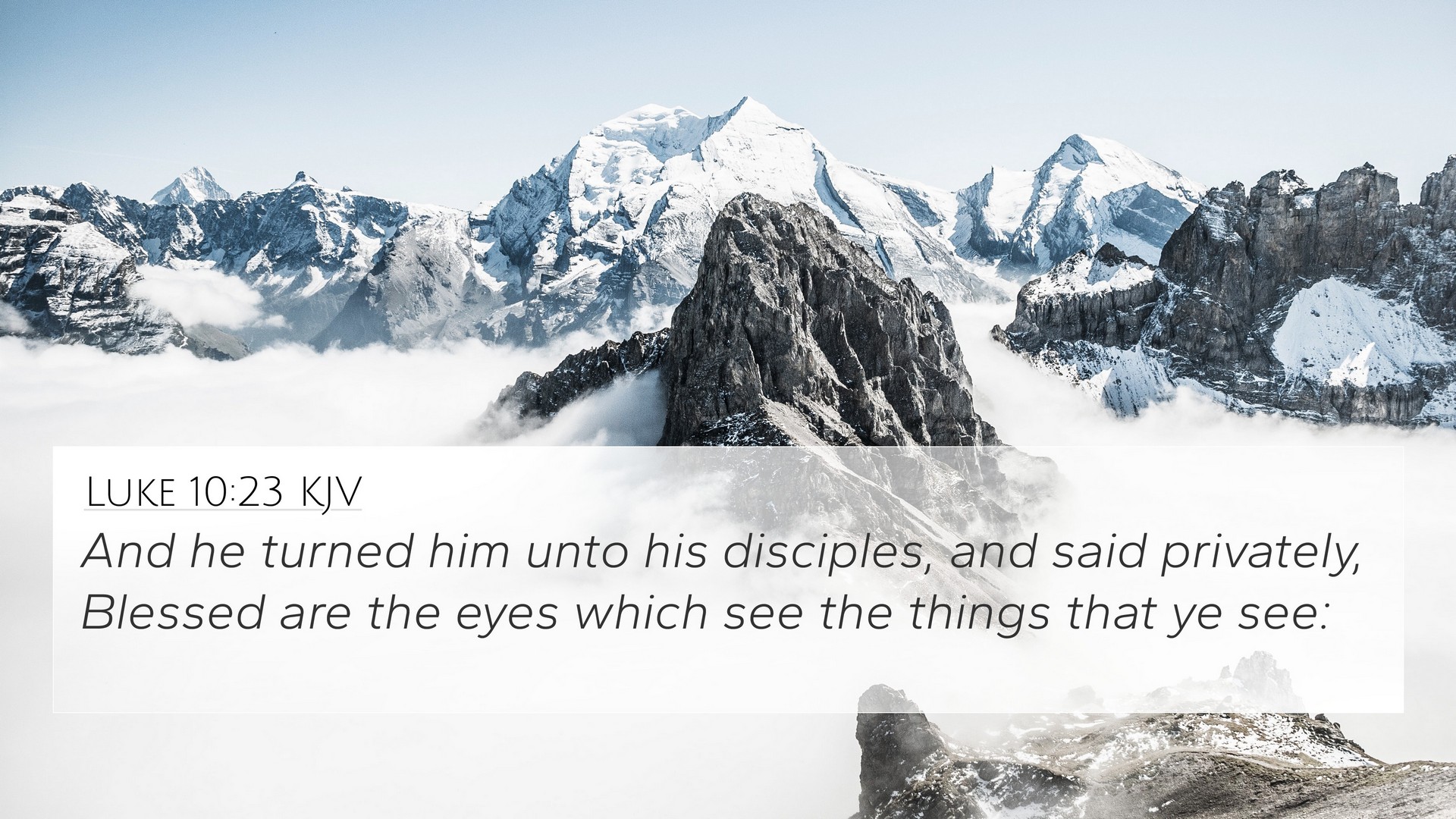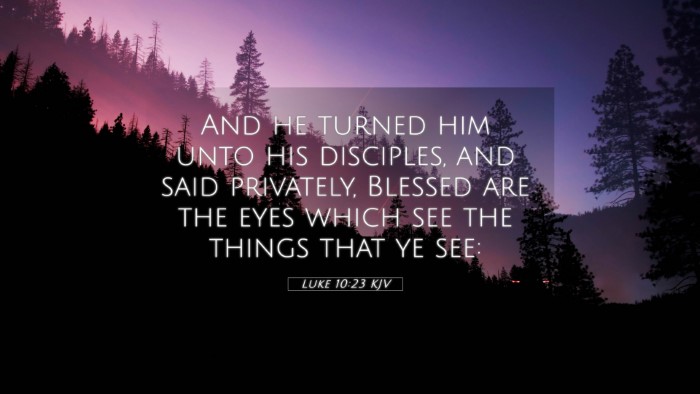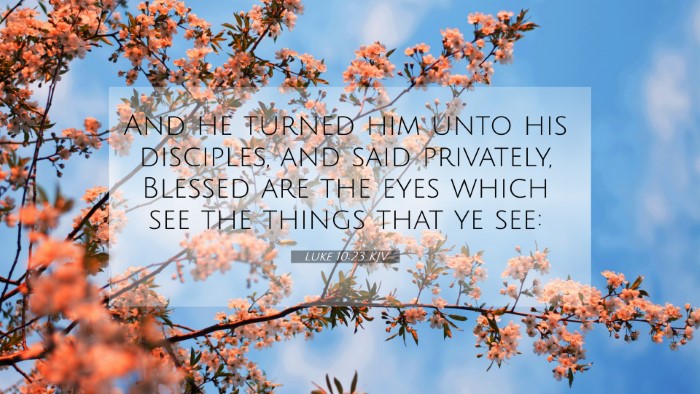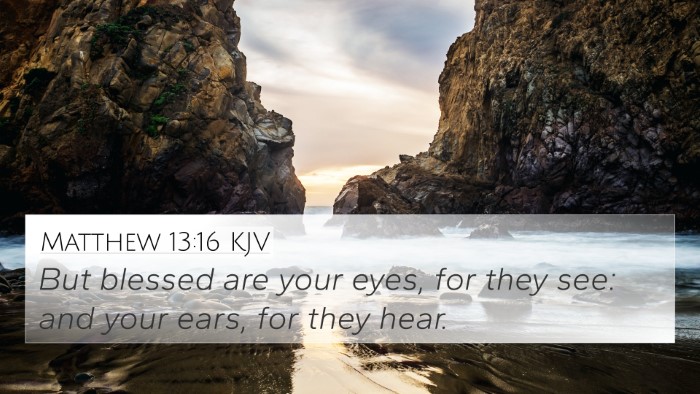Understanding Luke 10:23
The verse Luke 10:23 states, "Blessed are the eyes which see the things that you see." This brief yet profound statement, made by Jesus, carries significant theological implications regarding divine revelation and the blessings associated with it.
Insights from Public Domain Commentaries
In examining this verse, we can draw insights from the works of renowned commentators such as Matthew Henry, Albert Barnes, and Adam Clarke.
Matthew Henry's Commentary
Matthew Henry emphasizes the special privilege enjoyed by those who witness the life and ministry of Jesus. He notes that the apostles and those who heard Jesus directly were blessed because they beheld His miracles and teachings firsthand. This perspective reminds readers of the significance of Jesus' earthly ministry and the blessings associated with knowing Him personally.
Albert Barnes' Commentary
Albert Barnes highlights that the "eyes" refer not merely to physical sight but spiritual insight. He interprets this verse as a call to recognize the fulfillment of God's promises through Christ. Barnes asserts the importance of recognizing what Jesus represents and the transformative power of seeing the truth of His mission — a privilege that later generations do not share in the same way.
Adam Clarke's Commentary
Adam Clarke further elaborates that this beatitude serves to encourage those who have faith in Christ. He suggests that while others long to see the miraculous events and teachings that the apostles experience, those who believe without seeing are equally blessed. Clarke's interpretation implies an important context about faith and belief beyond mere physical observation.
Connections Between Bible Verses
Luke 10:23 can be cross-referenced with several other Bible verses that expand upon its themes of perception, spiritual insight, and the blessings of faith. Here are some related scripture references:
- Matthew 13:16-17: This passage parallels Luke 10:23 by reiterating the blessedness of seeing and hearing the truths of the Kingdom of Heaven.
- John 20:29: Jesus states that those who believe without seeing are blessed, reinforcing a theme of faith transcending visual evidence.
- 1 Peter 1:8: This verse reflects on joy and the deeper understanding of Christ, even without direct observation, aligning with Clarke’s insights.
- Hebrews 11:1: The definition of faith calls believers to trust in what is not seen, echoing the sentiments of spiritual perception discussed by Barnas and Henry.
- Matthew 5:8: "Blessed are the pure in heart, for they shall see God," emphasizes the connection between spiritual clarity and divine revelation.
- Luke 8:10: This verse discusses the knowledge of the mysteries of the Kingdom, reinforcing the importance of spiritual insight that Jesus speaks about.
- James 1:12: This verse confirms the blessings that come from enduring trials and loving God, showing a relationship to spiritual observation and insight.
- Revelation 1:3: This verse promises blessings for those who read and heed the prophecies, aligning with the theme of perceiving God's truth.
- Luke 12:32: Where Jesus encourages his followers not to fear, affirming that the Father has graciously given the Kingdom — a testimony to seeing and being granted insight.
Thematic Bible Verse Connections
Thematic connections can be made between Luke 10:23 and the broader narrative of the New Testament, particularly regarding the revelation of Jesus as the Messiah. The prominence of spiritual sight in this verse leads to various interpretations reflecting on God’s grace, the coming Kingdom, and our response to divine revelation.
Faith and Observation
Through the exploration of these verses, we notice the recurrent theme: faith allows believers to see the unseen realities of God’s Kingdom. Understanding Luke 10:23 invites us to deepen our faith and realize that spiritual insight is a gift from God.
Encouragement for Believers
For modern readers, this verse serves as an encouragement to seek genuine insight into God’s Word and to recognize the privilege of spiritual understanding. Recognizing the connections between passages can enhance one’s study of the Bible, allowing believers to identify deeper meanings and applications in their lives.
Recommended Tools for Bible Cross-Referencing
To enrich your study, consider utilizing tools for Bible cross-referencing such as:
- Bible Concordance: Useful for finding specific terms and themes across various passages.
- Bible Cross-Reference Guide: Provides a systematic way to explore connections between verses.
- Cross-Reference Bible Study: Involves comparative analysis of verses to highlight spiritual themes and discussions.
- Bible Reference Resources: Essential for delving into deeper understandings of scripture.
- Bible Chain References: A method to link verses thematically, aiding in memory and application.
Conclusion
Luke 10:23 serves as a powerful reminder of the blessings that come to those who understand and perceive the truths of God’s Kingdom. Engaging with the broader context through cross-references and commentaries enriches one’s understanding and deepens one’s faith. The journey into scripture is illuminated by other verses, showcasing the intricate design of God's revelation, affirming that in any era, the blessings of spiritual sight remain paramount.



